ATLANTA, GEORGIA
February 15, 2020
STRANGER: Deborah VanTrece
LOCATION: Twisted Soul Cookhouse & Pours, 1133 Huff Road NW Suite D, Atlanta, Georgia
THEME: Chatting with an Atlanta-based chef about her quest to reinvent soul food
Ask Deborah Vance how she got started in the food industry, and she laughs.
“I got fired from a zoo concession stand on the first day.”
It was an inauspicious start for someone who’s become a pioneering Atlanta chef aiming to reinvent what people think of as soul food. Her unconventional path to becoming owner of the popular and award-winning restaurant Twisted Soul Cookhouse & Pours took a few other sidesteps, including many years as a flight attendant. “So I also knew how to cook in a galley on a plane,” Deborah adds with another laugh.
We’re sitting at a prime table in her gorgeous venue, decked out with high quality hardwood tables, comfy chairs and subtle but unusual artwork like five tin sheets hanging on one well. Our table is next to a beautiful white birch tree with a string of soft white lights wrapped around it. A comfortable setting for comfort food.
It’s not even 7pm on the Saturday of Valentine’s Day weekend and already the place is packed. People flock from around the city and beyond to sample the chef’s spin on traditional dishes like fried green tomatoes, fried chicken, meatloaf and more. She says the menu is based in part on her travels around the world as a flight attendant, which opened her eyes to what people in other countries think of as soul food.

“The inspiration of the whole restaurant is globally inspired soul food,” Deborah tells me. “As a flight attendant my travel experience wasn’t always as a tourist, I would get immersed in the culture of other countries, sitting in peoples’ homes and dining with them. Add that to my culinary training, because I did go to culinary school, and the fact I come from a family of great cooks, and it’s kind of melding of all that.”
It’s a winning strategy that brings accolades, including Deborah scoring the Atlanta Business League’s 2017 Super Tuesday Conference Award, and the James Beard House and American Cuisine Cook Book showcasing some of her favorite recipes.
But as I’ll learn during our two-hour dinner, the path to her current success had plenty of hurdles for a lesbian African-American aspiring restaurant owner.
“I was raised to believe I could do anything but I was also raised in a realistic family where, yes, color does mean something but don’t let that control your footsteps,” she says. “So I do what I want to do when I want to do it, and quite often I’m so busy trying to move forward I forget to realize, okay, what I’m doing is a big deal.”
Deborah adds that her charge-ahead attitude and confidence in her abilities helped advance her career in an industry where she didn’t see anyone that looked like her, and now she wants to use her position to assist others. “People will bring it to my attention that there’s a lot of people who look up to me and see me as a role model. I’m opening doors that have not been opened before and now it’s important to me to make sure not only do I open them but I knock them down so they don’t close behind me.”
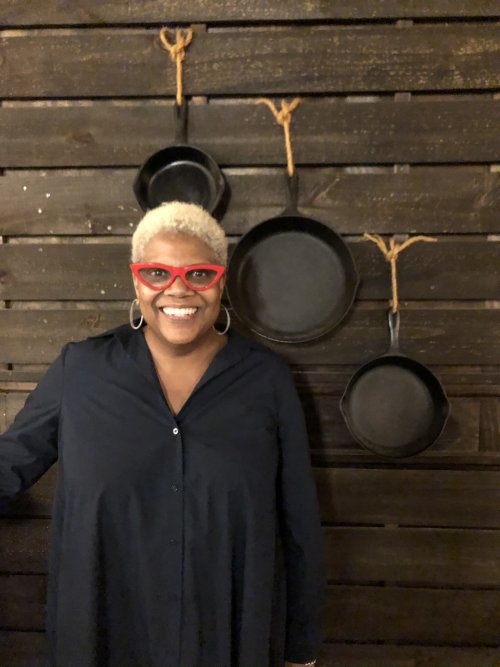
Dressed all in black save for a pair of angled cherry red glasses and a pop of blonde hair, Deborah exudes a kind of playful confidence, balancing the professional tale of her undeniable success in the restaurant business with a laid back but vibrant personality that’s quick to joke while being charmingly honest about her ups and downs.
Although the restaurant is bustling tonight, Deborah says she can sit and chat with me, talking through some of her menu highlights until she’s needed in the kitchen.
“Usually I’m deep in the kitchen, I do the expediting, watching what’s happening. I can tell when my kitchen’s getting overwhelmed because we have a very high demand, and demanding customers — in a good way,” she tells me with a smile. “Sometimes we open the door and in 30 minutes we’re full and tickets are coming in to the kitchen with nowhere to put them, and because I can cook on the line I know when you’re overwhelmed; you’ve got orders for five fried chickens, eight omelets, this one doesn’t want that, this one wants something on the side, and all the time you’re trying not to look at a ticket because if you’re looking at a ticket you’re wasting time.”
Deborah’s oversight in the kitchen helps things run efficiently behind the scenes. But she’s also known to help out front of house as needed, sometimes as a server if her waiters are slammed, or as the hostess if her regular staffer has temporarily stepped away from the desk. It’s a smooth system that helps Twisted Soul turn out dish after dish of gorgeously arranged soul food night after night.
My first chance to sample the chef’s creative choices is with the arrival of the appetizer; fried green tomatoes with goat cheese and crawfish.

Deborah, who was born and grew up in Kansas City, Missouri, says her dishes meld the food she ate as a child with more “traditional” soul food and her later introductions to different cultures and food while traveling the world for an airline, learning what was “comforting or soulful” to them and having it inform the menu. “So I take all of that, do what I want with it, but try to bring back a little of the soul, a little of the south.”
The starter is a prime example of that effort, taking what some would see as a staple Southern food item — fried green tomatoes — but evolving the dish with the addition of tangy goat cheese and a delectable remoulade. “I didn’t grow up with fried green tomatoes, but when I was pregnant I was craving them and my friend made them for me, and from then on I loved those little things. The fun thing about fried green tomatoes is what you put on top. I have a grandfather from Louisiana and I like to play upon Louisiana cuisine. I wanted something a little bit Southern, a little bit Louisiana, so I thought let’s make this crawfish remoulade. And for the flavor profile I wanted the something that was a little tart to stand up the sweetness of the tomato.”
I’m ecstatic with each bite of the perfectly fried tomatoes, the sweet and tart flavors blending together in harmony with a remoulade I could eat alone by the spoonful.
“I love the idea of comfort food as soul food,” she tells me, and glances at my plate. “And that’s comfort food, and with each dish there’s a story involved.”
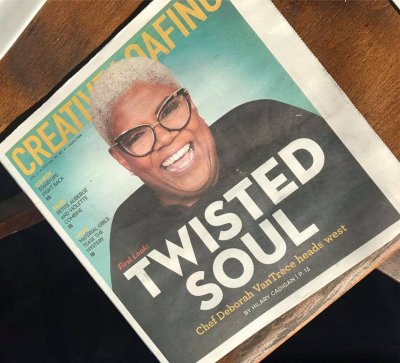
Deborah’s story starts in Kansas City, getting her first experience in the food industry at the city zoo’s concession stand — and fired on day one because she was sick and needed to go home, but her manager didn’t believe her. She tells the story with such humor that I’m crying tears of laughter. “I don’t think anyone knows that,” she laughs.
Originally interested in fashion, Deborah studied it at the University of Missouri and even did some local modeling gigs. After graduation she became a flight attendant, drawn to the idea of traveling the world and exploring different countries.
Still in the closet at that time, she dated then married her high school sweetheart.
“That’s cute,” I remark.
“It was for a bit, didn’t quite work out,” she replies with a dry chuckle.
The couple were based in Texas, where Deborah’s husband was a basketball player. While he shot hoops, his wife enjoyed life in the skies. “I could buy pretty clothes, model on the side, find incredible food and things to bring home,” she recalls happily. “Flight attendants live a life of millionaires jetting around the world. It’s really influenced what I do, and gave me a different perspective on a lot of cultures. I love that we’re all different because a world where we’re all the same would be boring as hell.”
Although she was enjoying life working for an airline, there was a strike in late 1993 that made he think about switching professions. “The union was warning you not to cross that picket line, and the company said if you don’t you’re probably not going to have a job. I thought that was some bull, and decided I needed to do something else.”
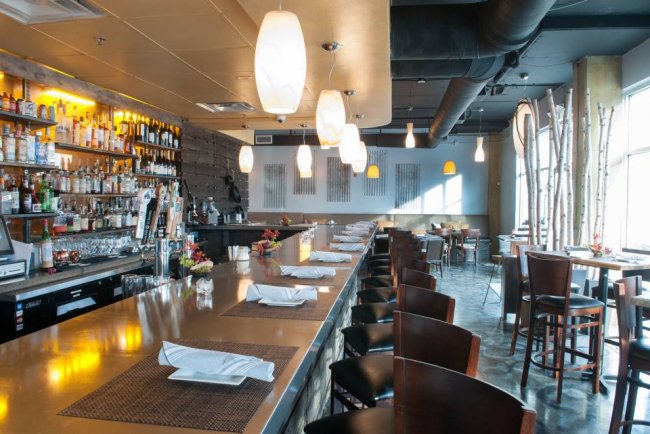
By then Deborah and her husband were living in the Atlanta suburbs, and she decided to take her lifelong interest in food by enrolling for a culinary degree at the Art Institute of Atlanta after seeing an advertisement for the course on television. She was in her mid-30s and pregnant with a daughter, but once the strike came to an end she still found the time and energy to balance her airline job and school.
While studying she felt like an underdog because the other, mostly white, students were all younger than her and had previous experience in the restaurant industry. “I lived in the suburbs in my own little world, eating at Olive Garden. I could tell you the hot restaurant in any other state or country, but not in Atlanta.”
She’d anticipated the potential for feeling like an outcast based on a conversation with an unpleasant white chef on one of her flights. “I asked him whether he’d eat anything and he said arrogantly said, ‘Of course I will,’ and I told him I didn’t know if I could do that and he said, ‘Oh well, then you can’t be a chef.
The memory makes Deborah roll her eyes, and she adds sarcastically, “Oh, okay, guess I can’t be a chef then. Up until then I had revered this guy and then he said that, and I just thought ‘asshole,’ bet if I said let’s eat some raccoon brains you wouldn’t.”
Deborah confides that attitudes like the miserable man on the plane help to propel her further, reinforcing her innate determination to succeed at whatever she attempts. That’s why it didn’t bother her much that her classmates at culinary school largely ignored her, and instead she zipped through the course in record time. “Before I knew it, I was graduating with people who started a year ahead of me.”
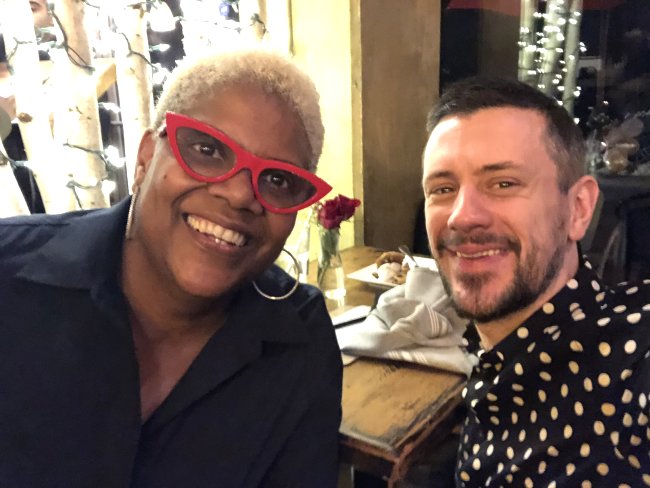
After graduation, Deborah characteristically kept her figurative plate full, launching her first food establishment in 1998, divorcing her husband, and coming out.
The Edible Art Café and Gourmet Catering was in business from February 1998 through to April 2002. The name stems from the fact that Deborah didn’t feel soul food was being presented well, regardless of how flavorful it was. “We were going through a point in the culinary world where presentation was beginning to be everything, but at a soul food restaurant you were expected to go through the cafeteria line — you know, there’s an old black lady sitting there, calling you her friend, ‘what you having baby?’ and dolloping it out on the plate,” she says. “And there’s room for that. But there’s also room for us to make our food beautiful. And that’s what I was doing. It was edible art.”
The gorgeous presentation of the dishes at Twisted Soul show presentation is still a priority. “I play with it visually, and it just kind of comes naturally. Even at home when I fix a quick plate I want it to look good. It’s a bit of an art form.”
Problems with the retail space that she rented for Edible Art led her to close shop in 2002 and focus instead on her catering business for several years.
Catering was, and remains, a very profitable and popular trade although now it’s done until the banner of The Catering Company by VanTrece that she launched in May 2002. “And the more clients I got, the more they’d tell me I should open a restaurant.”
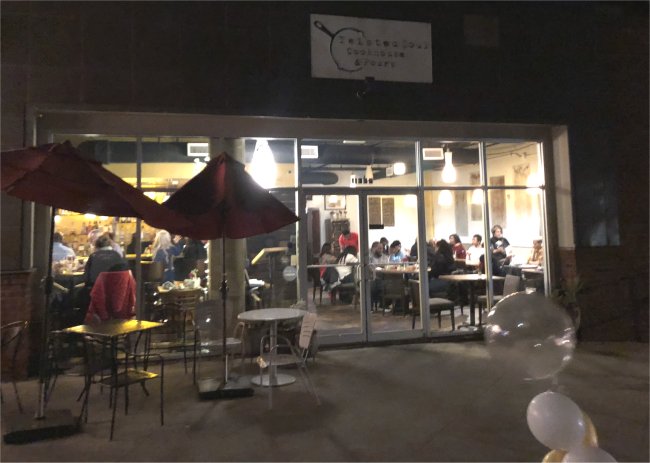
In December 2014 she finally decided to try and brick and mortar establishment again, opening the first iteration of Twisted Soul Kitchen and Bar in Decatur, Georgia. But she and her concept never really clicked with the neighborhood. “I wasn’t in love with the location, the parking wasn’t great, it was just not easy to get to.”
Race was a factor as well. “As far as getting a wonderful mix of diverse clientele it was a hard thing to do,” she remembers. “I was the only black restaurant owner there and it was kind of like I wasn’t in the club with them and they all knew each other. You know, ‘Who is this woman opening this restaurant?’ So it just didn’t feel good.”
Thankfully, Deborah was savvy enough to only sign a year lease at the Decatur location, and moved out in December 2015. But she was committed to the Twisted Soul concept, and exactly 12 months later opened in her current location in Atlanta.
The slightly renamed Twisted Soul Cookhouse & Pours has been a favorite of critics and diners alike since opening, and Deborah is a leading figure in the local food scene and also on a national with her work for the James Beard Foundation and others. She tells me that guiding everything is her vision of a fresh take on soul food.
“Growing up, soul food in general always had a negative connotation that everything’s friend. And that’s not true. It comes from slaves who had nothing, who were given the leftovers and made something that was really good. They added spice and flavor and heart, and soul food become a kind of melting pot depending on where you are, you’re taking on the tradition of where you landed and what you brought with you.”
That’s why soul food differs regionally and internationally, she says. “One of my biggest examples is fried fish. I grew up eating it with spaghetti, that’s just what you do. Down here it’s like ‘what are you talking about? Fried fish goes with grits.’ There is a regional part to soul food that expands broader than this narrow view.”
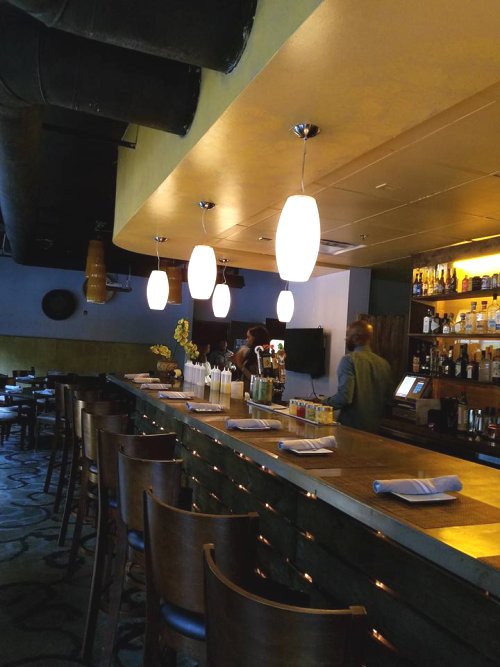
When Deborah moved to Atlanta she was disappointed to see food labeled as “Southern” instead of “soul,” as if the latter were some negative descriptor. “I beg to differ, and I want to change that idea. There have been African American chefs that I’ve cooked with who at one point were like, ‘Oh no, I don’t cook that food.” Well, what is that food? Because this is the food that nourished us and was handed down to us.”
Present day, Deborah says soul food is fun to make and has even become fashionable. Look at the shift to growing vegetables naturally and reducing the preservatives used in cooking, she says. “It’s taking the practice of our ancestors who were farming and not being wasteful. Soul food has been about sustainability from the very beginning. And I’m very proud of that. And I will talk about that. It’s not to disconnect soul food from the South, but I don’t buy that you’re a soul food restaurant just because it’s Southern.”
She crafts the menu for Twisted Soul based on her extensive references, saying, “When I borrow ideas from other cultures, it always comes from a place of love, from a conversation or dish I’ve had that speaks to me, and now it’s my take on the dish.”
For my entrée I’m trying another of her creations; meatloaf with blue cheese grits.
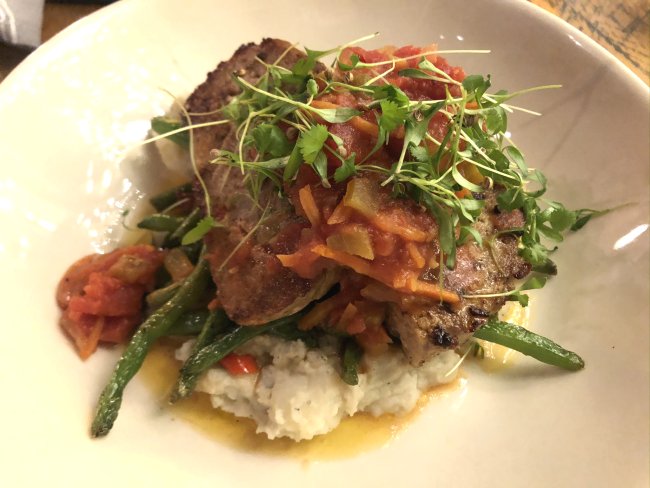
“It’s fantastic,” is all I can manage between deliriously joyful mouthfuls.
Happily, Deborah is on hand to offer a more detailed description of the dish. “I like blue cheese and I like port wine, so the combination with the natural sweetness of the tomato, add a little port wine to it, the sweetness of that with the sharpness of the blue cheese, they go well together. And I chose turkey for the meatloaf because it’s a health option. But it’s really about the seasoning and the flavors more than anything.”
Offering healthy food options is a priority at Twisted Soul. “I am really concerned about what I put in my mouth, I like to know where my food is sourced from.”
She’s constantly researching potential suppliers, and says people are always approaching with offers for their vegetables, meats, and other supplies. Deborah places such a premium on the quality of her food because of health issues in her community. “We’ve equated that if it’s big we’re getting value and for me that’s where health issues come into play. Our ancestors didn’t’ each like that. We’ve become a culture across the years where it became more fashionable to have processed food than have it growing in a garden, and the result is that we were getting sick physically.”
Part of her work to encourage healthier eating is to gently push the envelope of Twisted Soul’s menu, including a ceviche dish that Deborah’s eating. It’s on offer as part of the restaurant’s special list of items for Valentine’s Day.
“A lot of people throw away the salmon belly, but again I try to utilize everything. So on our regular menu we have a salmon belly bacon that we smoke and cure, but for this weekend I thought it’d be cool to do something different — let’s do ceviche.”
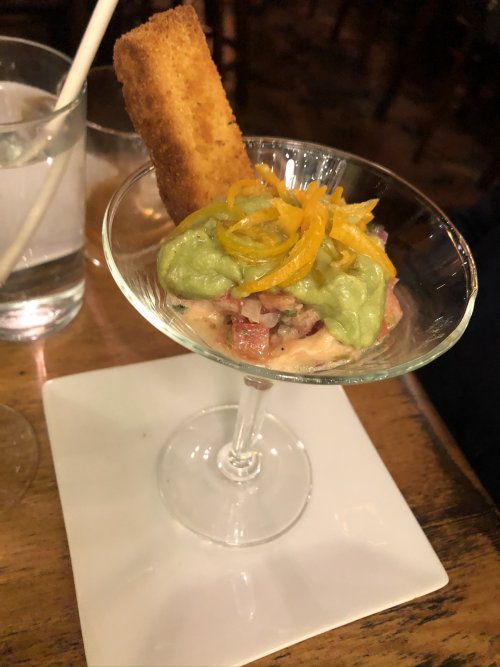
Served elegantly but simply in a martini glass, the ceviche features salmon belly, cumquats, and avocado. “I have a friend who has a cumquat tree and he gave me a bunch of cumquats, so I pickled them, and avocado sounds fresh, so I made this salmon belly ceviche with whipped avocado and pickled cumquats,” Deborah says, adding that it’s proven to be so much of a hit with diners she might keep it around.
Though some people might not associate ceviche with soul food, she says that’s exactly what it is. “In Latin America, ceviche is soul food, they eat it walking down the street.”
And if someone disagrees that something like ceviche qualifies as soul food?
“Sometimes I say, ‘Who are you to tell me what my soul food is?’ For each of us it’s individual, you can’t really group it. If I say fish and spaghetti to someone from the South, that’s not their thing — but it’s mine, and I grew up with, and when I go home to Kansas City that’s what I know I’m going to get,” Deborah tells me.
“When I started to travel out of the country, my whole idea of what I considered soul food was totally blown away,” and then, getting more excited, she starts to explain how different cultures use the same food, throwing in country after country as examples. “In Asian culture they were cooking and frying chitlins. Now, African Americans do that too but even more so in Asia. And in France they make sausages with them! I saw a chitlin sausage recipe in a Jacques Pépin cookbook and I thought, ooh he’s bougie,” she says, laughing. “Here, chitlins are something the slaves ate and it’s pretty much totally just about the African American community using every little scrap. But in Spain? They fry or braise them. And it’s really amazing to see all these different foods.”
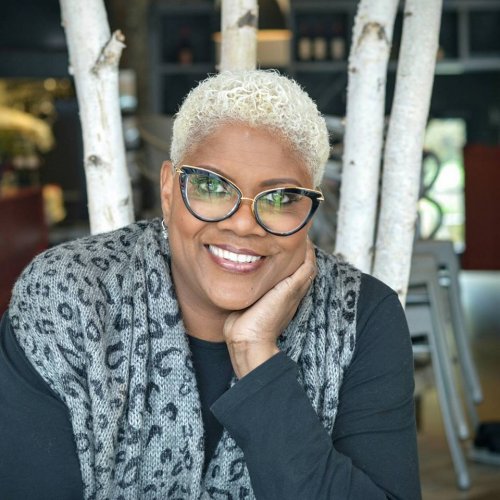
In addition to her non-stop work at the restaurant, Deborah also adds to her ever-expanding to-do list with a host of charitable endeavors and other projects.
She’s working on her first cookbook, and says that’s time consuming.
And she teamed up with two other female Atlanta-based chefs for “The Cast Iron Chronicles,” a three-part dinner series “debunking the myths of soul food, racial inequality, and gender representation in the industry.”
The series came about thanks to the chefs reading separate profiles about each other and realizing they had a combined story to tell about the evolution of soul food. And she’s proud that three black Atlanta restaurant owners secured such a prominent platform for their message. “It’s important that we’re putting ourselves out there.”
Other projects include fundraisers that help to send people to culinary training courses, support for female leadership programs, and almost countless other tasks.
Miraculously, she still manages to find some free time with her family that includes her wife Lorraine (they married in 2016) and daughter Kursten. And Twisted Soul is a family affair; Lorraine and I exchanged several emails to plan the interview with dinner, and Kursten is in charge of the bar and the irresistible drinks menu.
Deborah starts to look around the room as it gets even busier, and she predicts it’ll soon be time to wrap up the interview and help out her team.
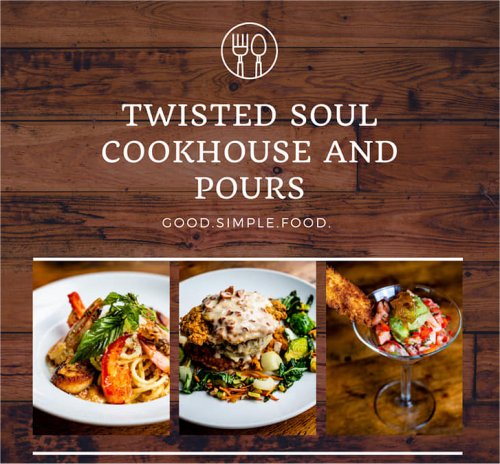
Sure enough, Deborah gets the signal from the kitchen and she’s finally needed, so we have to bring dinner to a close. I’d love to spend many more hours dining with her and listening and laughing along with her stories, but I’m honored to have had this evening.
As she gets ready to leave me to enjoy the dessert, she reflects again on her life story all the way from getting fired from the zoo through to owning Twisted Soul.
“I appreciate Kansas City now but my life would have been totally different if I stayed. Staying was not an option,” she says. “In Kansas City, black neighborhoods and white neighborhoods do not intertwine as they do here. The things I’ve been able to accomplish here in this city that is predominantly black I would not have accomplished in Kansas City as quickly. It’s not as if – bam! – I got it immediately in Atlanta. I worked for it, and I worked hard. But the African American community here and they love they have given me is so widespread. I’m glad I had the opportunity to come here because once I came here my idea of the south changed drastically.”
And she’ll keep working to ease the path for other African American and LGBT chefs in the future so they don’t have to face the same hurdles she did, including through mentoring programs and other assistance for aspiring chefs.
She explains that Twisted Soul was entirely self-funded in part because it’s much easier for white restaurateurs to get accesses to bank loans than for African American chefs. “I worked two jobs hard, and if I had to get on my hands and knees I would. It doesn’t come easy to us; to African Americans, to gays, lesbians, and then when you it all together, yeah, there are some hurdles” she adds with a dry laugh.
“But I didn’t spend much time looking for help,” Deborah says. “I am a mover and manipulator and will work for it. You tell me ‘no’ one time, okay, I’ll move on and figure it out. And sometimes I’ve been moving so fast I forget to look back and realize that, wow, that was a barrier but I just went right through it. It’s been a long road for me and I don’t want others to have to take as long as I had to take to get where I’m at.”
No matter how busy she gets, Deborah wants to make sure people get a good meal.
“I feel blessed to come in and do it in my own space, I want people to have a good time as if they were coming into my home,” she says. “I love it.”